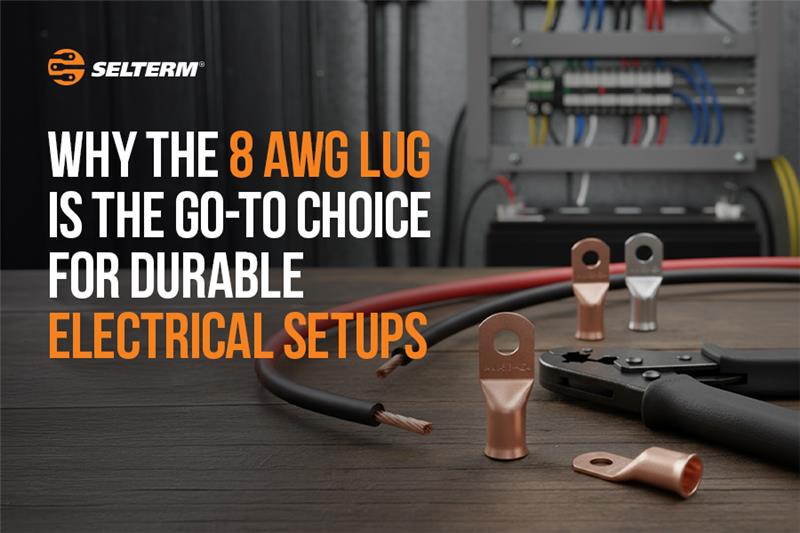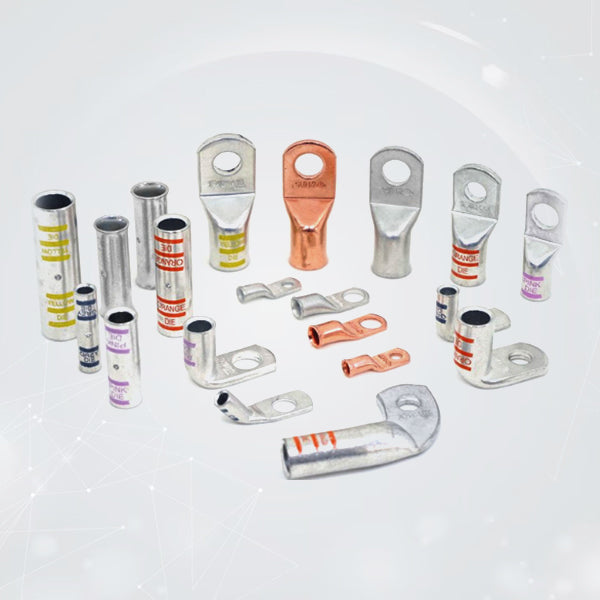
Why The 8 AWG Lug Is The Go-To Choice For Durable Electrical Setups
Worried about loose or flaky electrical connections in your vehicle, boat, or RV?
A bad lug often shows up as overheating, intermittent power, or unexplained faults that eat your time. They’re also a safety risk. That’s why choosing the right lug matters.
This is where the 8 AWG lug comes in. Built for strength and consistent performance, it handles higher currents safely, reduces resistance at connection points, and keeps your electrical system reliable over time.
Its sturdy design makes it ideal when you’re wiring an RV battery bank, a marine panel, or a DIY car audio install. Fit it cleanly, torque it right, and you’ll cut down on maintenance and troubleshooting — that’s where reliability starts.
Understanding The 8 AWG Lug
The 8 AWG terminal lug (also known as 8 AWG lug or 8 gauge battery lug or 8 gauge copper lug) is a connector specifically designed to connect 8-gauge wire to a stud, terminal, or battery post. The copper material provides good conductivity, as well as excellent resistance to corrosion over time, which provides reliable performance not just immediately but for years down the line.
Compared with smaller gauges like 10 or 12 AWG, the 8 gauge copper lug carries higher current safely. That lowers resistance at the connection point and reduces heat under load.
For retail users, knowing the differences between terminal lugs matters. The 8 AWG terminal lug hits a sweet spot between size and power. It fits in tighter spaces but still handles demanding current loads.
Whether you’re doing a car mod, wiring an RV, or fitting a marine panel, the 8 AWG lug gives the consistent, low-maintenance connections smaller gauges can struggle to keep.
Applications And Use Cases
The 8 AWG lug works well across many retail-friendly uses. It's reliable, easy to install, and handles power safely. Here's where it stands out:
- Golf Carts: Electric carts need solid battery connections. 8 gauge battery lugs ensure smooth power transfer and help stop voltage drops during long rides.
- Marine Applications: Saltwater and humidity damage weak connectors fast. 8 AWG lugs hold up in harsh conditions, keeping your connections safe and strong.
- Car Modifications: Upgrading a sound system? Adding an extra battery? Boosting performance? These lugs keep power flow steady and prevent connection issues.
- RVs: RVs depend on quality wiring to power your lights and appliances. These lugs give a reliable connection from the battery to the electric circuits in the RV.
- Solar Installations: 8 AWG lugs are a great option for DIY solar setups and projects. They will safely and efficiently handle moderately powered systems.
- DIY Projects: Whether you're working on small electronics or a bigger build, 8 AWG lugs are easy to use and work with many setups.
Simple Tip for Retail Users:
Always match the lug to both the wire gauge and stud size. This avoids loose connections. A proper fit gives better performance and cuts down on future maintenance.
Advantages Of Using 8 AWG Lugs
There are several reasons why the 8 AWG lug is a go-to for long-lasting, durable setups:
- Durability: Copper lugs hold up well. You can install and remove them more than once without ruining the connection.
- Corrosion Resistance: An 8 AWG terminal lug doesn’t rust easily. That’s a big plus in places with moisture, like marine or outdoor setups.
- Reliable Power Flow: When crimped right, an 8-gauge copper lug keeps resistance low. That means power flows better and more evenly.
- Easy to Work With: They’re simple to install. Just crimp or compress — no complicated tools. Good for DIY, still holds up under real use.
- Handles More Power: These lugs can take on medium-current loads in cars, boats, solar systems — places where smaller lugs might fail.
These benefits make 8 AWG lugs a smart choice for retail users who want both strong performance and reliable safety in their electrical work.
How To Pick The Right 8 Awg Lug
Choosing the right 8 AWG lug isn’t as hard as it sounds. Just keep a few simple things in mind:
Material: Copper is your best bet for solid conductivity. Bare copper works fine indoors or in dry spots. For marine or outdoor use, go with tinned copper — it holds up better against rust.
Compatibility: Make sure the lug matches both the wire size and the stud size. An 8 AWG lug made for 8 gauge wire gives the best connection and less chance of power loss.
Installation Method: Most 8 AWG lugs need a crimping tool for a good, tight fit. Some can be soldered too, depending on what you're working on.
You can find plenty of options for 8 gauge battery lugs and copper lugs. Whether it's for a golf cart, solar panel, or something else, just make sure the one you pick fits right and is made to last.
Wrapping It Up
When it comes to electrical setups, a reliable connection makes all the difference. That’s why the 8 AWG terminal lug continues to be a go-to for many.
It works across different uses — from vehicles and RVs to solar systems, marine setups, and home projects. It handles power well and keeps your system stable.
Durability, easy installation, and steady performance make it a smart pick for DIYers and professionals alike.
Looking for a high-quality option you can count on? Explore Selterm’s 8 gauge copper lug, made for clean installs, strong conductivity, and long-term use in real conditions.
Get the right fit from the start, and keep your setup safe, efficient, and ready for anything.





